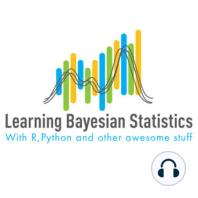52 min listen

#11 Taking care of your Hierarchical Models, with Thomas Wiecki
#11 Taking care of your Hierarchical Models, with Thomas Wiecki
ratings:
Length:
58 minutes
Released:
Mar 11, 2020
Format:
Podcast episode
Description
I bet you already heard about hierarchical models, or multilevel models, or varying-effects models — yeah this type of models has a lot of names! Many people even turn to Bayesian tools to build _exactly_ these models. But what are they? How do you build and use a hierarchical model? What are the tricks and classical traps? And even more important: how do you _interpret_ a hierarchical model?
In this episode, Thomas Wiecki will come to the rescue and explain what multilevel models are, how to build them, what their powers are… but also why you should be very careful when building them…
Does the name Thomas Wiecki ring a bell? Probably because he’s the host and creator of the PyData Deep Dive Podcast, where he interviews open-source contributors from the Python and Data Science worlds! Thomas is also the VP of Data Science at Quantopian, a crowd-sourced quantitative investment firm that encourages people everywhere to write investment algorithms.
Finally, Thomas is a longtime Bayesian and core-developer of PyMC3, a fantastic python package to do probabilistic programming in Python. On his blog, he publishes tutorial articles and explores new ideas such as Bayesian Deep Learning. Caring a lot about open-source software sustainability, he puts all he’s up to on his Patreon page, that you’ll find in the show notes.
Our theme music is « Good Bayesian », by Baba Brinkman (feat MC Lars and Mega Ran). Check out his awesome work at https://bababrinkman.com/ (https://bababrinkman.com/) !
Links from the show:
Thomas’ series on Hierarchical Regression: https://twiecki.io/blog/2013/08/12/bayesian-glms-1/ (https://twiecki.io/blog/2013/08/12/bayesian-glms-1/)
Non-centered Parametrization with PyMC3: https://twiecki.io/blog/2017/02/08/bayesian-hierchical-non-centered/ (https://twiecki.io/blog/2017/02/08/bayesian-hierchical-non-centered/)
Using Bayesian Decision Making: https://twiecki.io/blog/2019/01/14/supply_chain/ (https://twiecki.io/blog/2019/01/14/supply_chain/)
PyMC3 - Probabilistic Programming in Python: https://docs.pymc.io/ (https://docs.pymc.io/)
Symbolic PyMC: https://pymc-devs.github.io/symbolic-pymc/ (https://pymc-devs.github.io/symbolic-pymc/)
PyData Deep Dive Podcast: https://pydata-podcast.com (https://pydata-podcast.com)
Thomas on Twitter: https://twitter.com/twiecki?lang=en (https://twitter.com/twiecki?lang=en)
Thomas on Patreon: https://www.patreon.com/twiecki (https://www.patreon.com/twiecki)
Thomas on GitHub: https://github.com/twiecki (https://github.com/twiecki)
Alex’s Hierarchical Model of Elections in Paris: https://mybinder.org/v2/gh/AlexAndorra/pollsposition_models/master?urlpath=%2Fvoila%2Frender%2Fdistrict-level%2Fmunic_model_analysis.ipynb (https://mybinder.org/v2/gh/AlexAndorra/pollsposition_models/master?urlpath=%2Fvoila%2Frender%2Fdistrict-level%2Fmunic_model_analysis.ipynb)
This podcast uses the following third-party services for analysis:
Podcorn - https://podcorn.com/privacy
In this episode, Thomas Wiecki will come to the rescue and explain what multilevel models are, how to build them, what their powers are… but also why you should be very careful when building them…
Does the name Thomas Wiecki ring a bell? Probably because he’s the host and creator of the PyData Deep Dive Podcast, where he interviews open-source contributors from the Python and Data Science worlds! Thomas is also the VP of Data Science at Quantopian, a crowd-sourced quantitative investment firm that encourages people everywhere to write investment algorithms.
Finally, Thomas is a longtime Bayesian and core-developer of PyMC3, a fantastic python package to do probabilistic programming in Python. On his blog, he publishes tutorial articles and explores new ideas such as Bayesian Deep Learning. Caring a lot about open-source software sustainability, he puts all he’s up to on his Patreon page, that you’ll find in the show notes.
Our theme music is « Good Bayesian », by Baba Brinkman (feat MC Lars and Mega Ran). Check out his awesome work at https://bababrinkman.com/ (https://bababrinkman.com/) !
Links from the show:
Thomas’ series on Hierarchical Regression: https://twiecki.io/blog/2013/08/12/bayesian-glms-1/ (https://twiecki.io/blog/2013/08/12/bayesian-glms-1/)
Non-centered Parametrization with PyMC3: https://twiecki.io/blog/2017/02/08/bayesian-hierchical-non-centered/ (https://twiecki.io/blog/2017/02/08/bayesian-hierchical-non-centered/)
Using Bayesian Decision Making: https://twiecki.io/blog/2019/01/14/supply_chain/ (https://twiecki.io/blog/2019/01/14/supply_chain/)
PyMC3 - Probabilistic Programming in Python: https://docs.pymc.io/ (https://docs.pymc.io/)
Symbolic PyMC: https://pymc-devs.github.io/symbolic-pymc/ (https://pymc-devs.github.io/symbolic-pymc/)
PyData Deep Dive Podcast: https://pydata-podcast.com (https://pydata-podcast.com)
Thomas on Twitter: https://twitter.com/twiecki?lang=en (https://twitter.com/twiecki?lang=en)
Thomas on Patreon: https://www.patreon.com/twiecki (https://www.patreon.com/twiecki)
Thomas on GitHub: https://github.com/twiecki (https://github.com/twiecki)
Alex’s Hierarchical Model of Elections in Paris: https://mybinder.org/v2/gh/AlexAndorra/pollsposition_models/master?urlpath=%2Fvoila%2Frender%2Fdistrict-level%2Fmunic_model_analysis.ipynb (https://mybinder.org/v2/gh/AlexAndorra/pollsposition_models/master?urlpath=%2Fvoila%2Frender%2Fdistrict-level%2Fmunic_model_analysis.ipynb)
This podcast uses the following third-party services for analysis:
Podcorn - https://podcorn.com/privacy
Released:
Mar 11, 2020
Format:
Podcast episode
Titles in the series (100)
#17 Reparametrize Your Models Automatically, with Maria Gorinova by Learning Bayesian Statistics